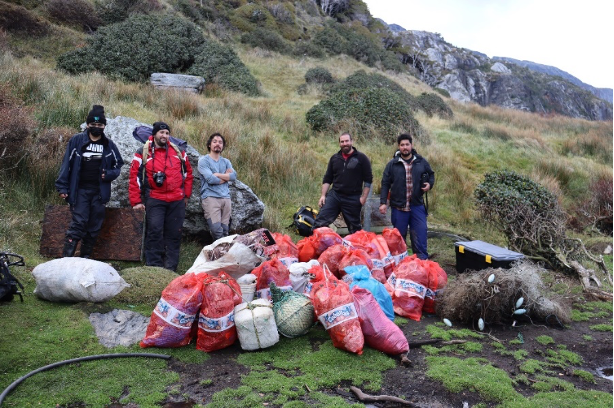239 kilos of anthropogenic waste were collected from two marine protected areas (MPA) in the Region of Magallanes and Chilean Antarctica: Almirantazgo Sound and Francisco Coloane, thanks to an expedition organized by WCS Chile and the Environment Regional Ministerial Secretariat at the beginning of 2021.

The trip aimed to remove waste from these areas and give them a correct final disposal, was framed in the Environmental Protection Fund for the Conservation of Marine Protected Areas, awarded in 2019, and whose main objective is to contribute to the conservation of the biodiversity, from three approaches that complement each other: education, extraction and waste management.
When we think of the marine areas of Magallanes and their ecosystems, we imagine pristine landscapes, away from human intervention and pollution. However, this idea is not entirely truth. Plastic waste is a problem that WCS in Magallanes has been identifying and addressing for years as one of the greatest threats to marine biodiversity. Trash interacts with protected species, such as the Jackson Bay elephant seals, and affects the health of the oceans and coasts and, therefore, the activities that benefit from these ecosystems, such as artisanal fishing, tourism, among others.
Types of waste and technologies for identifying contaminated areasIn the two areas where we worked during this expedition, it was observed that waste has two types of origin, while some is left by people who frequent the area, others are brought by currents and wind. And what type of waste is it? It is mainly polyurethane foam, plastic bags of all types, as well as lead-acid batteries and type 7 plastics, such as nylon and rope.
During the campaign, the work team evaluated the possibility of using technologies for waste identification, using an unmanned aerial vehicle (UAV) and a remotely operated underwater vehicle (ROV), thus determining its usefulness for future surveys due to the time and resource savings in the identification of new contaminated sites.
Thanks to the knowledge generated in the implementation of this project, the hope is to have a waste management strategy for the marine protected areas of Magallanes that can be extrapolated to national level.
Conservation of marine protected areas in Magallanes, Chile.